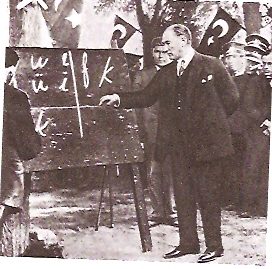|
6yFollowing the Ottoman defeat of Allied Powers in World War I, Turkey’s
power was limited to the region of Anatolia
with the signing of the Treaty of Sevres. France
took the Arab lands of modern-day Lebanon
and Syria, and the British
mandated Iraq and Palestine. The spoils of
war, particularly ownership of the oil fields, were taken from the hands of the
Ottoman Empire and placed in control of Great Britain. As seen in the
documentary The First World War, the Turkish military forces held their
ground against the Allied forces at Gallipoli and the capture of Sir Charles
Townshend’s British forces at Kut-Al-Amara (The First World War). Though
ultimately defeated in WWI, Turkish forces were later fueled by a strong sense
of nationalism under the leadership of Mustafa Kemal. As a result, Turkish
forces participated in a campaign of military expansion which resulted in
French, Italian and British European colonial powers negotiating terms
recognition of the new borders of Turkey with the signing of the Peace
of Lausanne (Tignor, 381).
Mustafa
Kemal instituted many reforms for the Turkish nation that removed the power and
central role of Islam and replaced it with the practice of secularism. In this
case, the western European policies backfired with the defiance and solidarity
of Turkey’s
expansion. Instead of reverting back to Islam,
Turkey’s future
under Kemal’s nationalist goals, was designed to be on par with the first world
western powers in order to have a political, social, and economic stake in the
world arena. In many cases, though non-reminiscent of Ottoman rule, nationalist
Turkey
adopted imperial practice in its pursuit of secularism. The following excerpts
are taken from Worlds Together Worlds
Apart, “Wearing the fez (a brimless cap) was criminalized, and Turks were
instructed to wear European-style hats. The veil, through not outlawed, was
denounced as a relic.”…“Turkish nationalists drew on Nazi examples by
advocating racial theories that posited Central Asian Turks as the founders of
all civilization” (Tignor, 381). As seen clearly, racial and religious
discrimination became a method of promoting Turkish supremacy.
Turkish
nationalism and the discrimination and suppression of certain rights as an
acceptable practice may be a direct result of the fact that Turkey was
never fully colonized by any European power. Though Germany
was influential, it did not rule and France
and Britain allowed the
Turkish autonomy in Anatolia to remain. As
seen in later examination, most of the countries of the Middle
East that were imposed with direct colonial rule reverted to back
Islam in defiance of the western ideals of secularism. This survival of Turkey enabled a transition from Imperial
Ottoman rule to the discriminatory rule of new social policy of secular Turkey; some of the imperial elements of
cultural prowess still remain in Turkey’s modern political, social
and economic policies. The quotes on the left and right columns are from
Mustafa Kemal Attaturk’s “Speech to the Congress of the People’s Republican
Party” as he turns his back on Islam while sympathizing and justifying discriminatory religious cultural practice.
|

Figure 1-1 Attaturk. In the 1920's, Mustafa Kemal,
known as Ataturk, introduced the Latin aphabet for the Turkish language
as part of his campaign to modernize and secularize Turkey. He
underscored hi commitment to change by being photographed while giving
instruction. (Tignor, 381)
Speech to the Congress of the People's Republican Party:
Gentlemen, it was necessary to ablosh the fez, which sat
on our heads as a sign of ignorance, of fanaticism, of hatred to
pregress and civilization, and to adopt in its place that hat, the
customary headdress of the whole civilised world, thus showing, among
other things, that no differnce existed in the manner of though between
the Turkish nation and the whole family of civilized mankind. (Kemal,
202)
If we made use of the law for the Restoration of Order in this manner,
it was in order to avoid such historic error; to show the nation's brow
pure and luminous, as it is; to prove that our people think neither in
a fanatical nor a reactionary manner. (Kemal, 202) |
